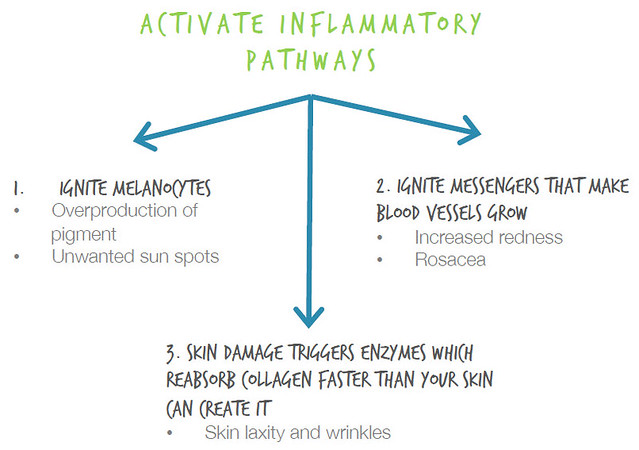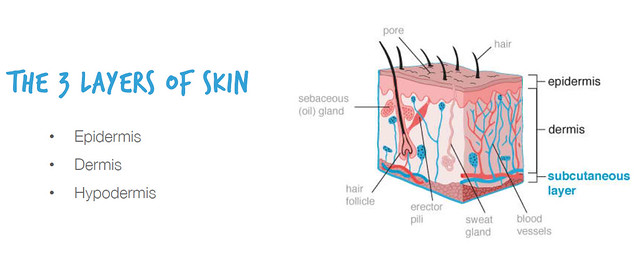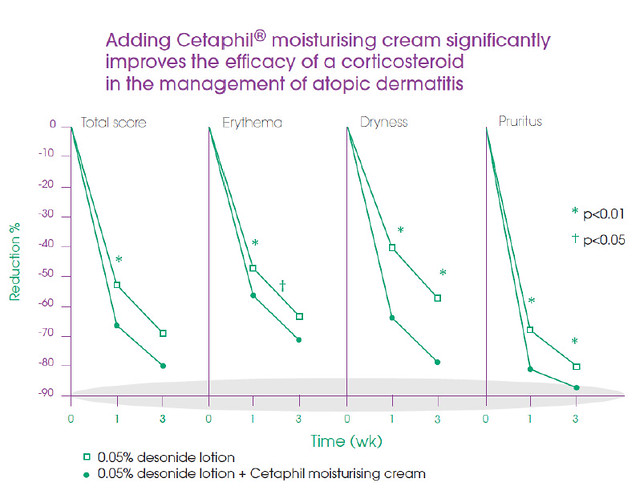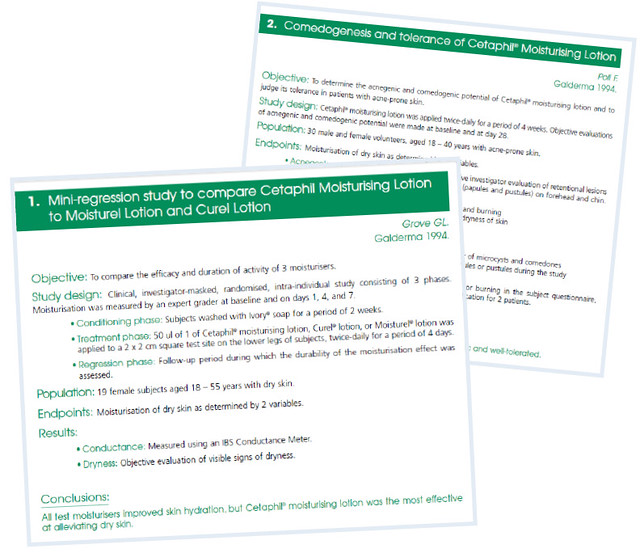Fortunately, Tracy Chean, Regulatory Affairs Manager at Galderma South East Asia, was very kind to answer all of my (and everyone else's) questions! If you've read the previous post you'll already have some idea of who she is, but in short, she ensures that Cetaphil and other Galderma products comply with strict safety and compliance standards, and is also a licensed pharmacist. She was very friendly and helpful in answering questions at the Cetaphil Experience Workshop, and I really appreciated her broad knowledge of everything from cosmetic regulation to skincare science.

Some of the bloggers during the session - everyone is busy taking notes!
As with the previous post, while the content of the answers is reflective of the information conveyed, it might not be the exact word-for-word answer that Tracy gave, just because I was furiously scribbling down notes during the entire session, and couldn't get down every single word said exactly. However, the gist of each of the answers is accurate. I've also added in some editor's notes (aka my own additional thoughts) here and there to provide supplemental information where appropriate.

A quick photo of one of my notes pages - I'm not kidding when I say I was furiously scribbling down notes!
So without further ado, let's take a look at some common questions about building your skincare routine, and Cetaphil products! If you want to learn more skincare facts, and find out what else went on during the Cetaphil Experience, do check out the Cetaphil Singapore Facebook Page!
Skincare Routine
Q: If I have dry skin, how often should I cleanse my skin? Is it true that I should cleanse my skin fewer times a day?
The idea that you shouldn't "over-wash" your skin stems from the belief that frequent cleansing with harsh ingredients compromises your skin natural p-H balance. There is some merit to this belief, because the more you wash your skin, the oilier it could end up being if you're using a harsh cleanser, as the skin might produce more oil to compensate for the lack of natural oil. That said, I don't want to be too prescriptive about the specifics of how many times a day you should wash your skin, but I think the general idea is that you don't want to be too harsh on your skin. The same principle of not using overly harsh cleansers also applies for oily skin as well - the idea is that you want to remove surface oil, but also want to strike a balance between removing dirt and being too harsh on your skin.

A graphic showing how inflammation can affect the skin, which can happen if skin is treated harshly or exposed to pollution particles
Q: When choosing a cleanser, should I make sure that it foams in order to be sure that it is effective?
Consumers often think that a cleanser has to lather in order to clean the skin, but it may actually dry the skin out. Some consumers like a squeaky-clean feeling skin, but if the skin is too tight after cleansing, it could actually be a sign that you are over-cleansing! So you need to go beyond looking at how it foams, and you need to look at the ingredients list to evaluate the cleanser, and ensure that it cleans effectively without being too harsh.
Q:If I have oily skin do I still need to moisturize?
Yes, even if your skin is oily, the inner layers of your skin still need to be hydrated. If the inner layers of your skin are dry, the skin may produce more oil as a compensatory response, so I would recommend that you still moisturize even if your skin is oily.

The three layers of the skin
[Editor's note: The outer layer of skin, the epidermis, may be oily, but at the same time, it is possible for the inner layers of skin to be dry, because skin is comprised of three broad layers - the epidermis, dermis, and hypodermis.]
Q: Would you recommend a cream or lotion product for oily skin?
In general, it's better to take the less risky option, in this case the lotion.
Q: Can I use expired skincare products?
The expiry date represents the company's assurance to the consumer that within the time period the product is efficacious. As such, it is not really recommended to use the product once it is past its shelf life (typically 2 or 3 years). Also, once the product is opened, the longer you use your product, the number of microbes in your product will start to increase, so I don't really recommend to use opened products past the recommended period.
[Editor's note: There were some follow-on questions as to how to read the expiry dates and signs. Basically, the shelf life of the product is determined by its expiry date, which is usually 2-3 years. That's how long the product can be kept on its shelf unopened. Once opened, then you would ideally want to use up the product within the number of months stated by the Period After Opening sign - the little open jar with "12M" or "6M" or "24M" on it.]
Questions on Cetaphil Products
Q: Which Cetaphil products would you recommend someone new to the brand start off with?
[Editor's note: Below is a list of products Tracy highlighted during the session, with the info compiled into one place, as this information was shared throughout the session.]
Cleansers:
1. Gentle Skin Cleanser: It's short ingredients list of 7 ingredients, which means that it is less likely to irritate sensitive skin
2. Oily Skin Cleanser: This cleanser has a stronger cleansing power, but also has glycerin and panthenol, which helps to ensure that it does not damage the skin barrier or dry the skin out
[Editor's note: I've actually reviewed both the above cleansers, and really like both of them. You can read my Gentle Skin Cleanser here, and my review of the Oily Skin Cleanser here.]
Moisturizers:
1. Moisturizing Cream: Unlike steroid creams which can cause skin thinning over time, the moisturizing cream does not thin skin out over time. The Cetaphil Moisturizing Cream has been shown to help improve atopic dermatitis when used together with a steroid cream.

Cetaphil Moisturizing Cream can help in the management of atopic dermatitis
2. Moisturizing Lotion: This offers effective hydration for dry skin, but is also proven to be non-comedogenic, and well-tolerated on people with acne-prone skin

Some of Galderma's own research on file on the moisturizing ability, comedogenesis, and tolerance of the Cetaphil Moisturizing Lotion
3. DailyAdvance Ultra Hydrating Lotion: This is best for skin that is extremely dry, and contains Cetaphil's Epidermal Replenishing Complex 5, or ERC5, to rapidly hydrate the skin, and provides hydration for 24 hours from a single application.
[Editor's note: ERC5 is actually a combination of 5 ingredients that are meant to help the product provide rapid hydration. For those curious, the 5 ingredients that make up the ERC5 are Sodium PCA, Panthenol, Shea butter, Cyclopentasiloxane, and Dimethiconol.]
Sun protection:
1. UVA/UVB Defense SPF50: This product has 7 chemical UV filters and 1 physical UV filters for effective protection against UV rays
[Editor's note: I know some of you are going to ask me about the UV filters and what rays they protect against, so here's a quick rundown: Ethylhexyl Salicylate (UVB), Titanium Dioxide (UVA2, UVB), Butyl Methoxydibenzoylmethane (aka Avobenzene, UVA1), Bis-Ethylhexyloxyphenol Methoxyphenyl Triazine (aka Tinosorb S, UVA1, UVA2, UVB), Octocrylene (UVA2, UVB), Drometrizole Trisiloxane (aka Mexoryl XL, UVA2), Ethylhexyl triazone (UVB), and Terephthalylidene Dicamphor Sulfonic acid (aka Mexoryl SX, UVA1, UVA2). The combination of UV filters does provide broad spectrum protection across both UVA and UVB rays, and also is largely photostable.
Interestingly Mexoryl SX and Mexoryl XL are both patented by L'Oreal group - and if you've read some of my other sunscreen reviews you might have seen me mention this before. Galderma developed the UVA/UVB Defense SPF50 in collaboration with L'Oreal, so this is the only Cetaphil product with both Mexoryl SX and Mexoryl XL.]
Q: Cetaphil's DailyAdvance Ultra Hydrating Lotion feels lighter than another brand's lotion. Does this mean the other brand's product is better for my skin?
Don't assume that just because something is greasy, it means that it is better for dry skin. Companies often formulate a product's texture to aesthetic specifications to appeal to customers, so the texture and feel of a product has a lot to do with how the company formulates the texture, and may not actually be a reflection of how effective the product is on your skin.
So that's a summary of what was shared at the very informative sessions! To learn more skincare tips and tricks, and find out more, check out the Cetaphil Singapore Facebook Page.













How I wish I had known about your blog before.
ReplyDeleteI discovered your blog a few months ago and I learned a great deal about skincare and hoaxes in the beauty industry (for example the charcoal in masks).
Thanks to your blog I'm a bit more alert about what I buy. Do you know the app Cosm'ethics ? If not, it is worth looking into it.
I absolutely love how you write your article, thoroughly researched and the grades you give. Make my life much easier.
So thank you :)
Ellana
@Ellana: Thanks for the kind words on my blog! I do put a lot of effort and research into my posts, so I'm always happy to see that others are interested in the geeky bits of skincare too! And there certainly is a lot of misleading information out there - not so much "hoaxes", but just a lot of incorrect information floating around. And the information comes not just from brands (who mostly are guilty of exaggeration) but also from some "consumer" sites like EWG, which often give very inaccurate toxicity ratings and spread misinformation and fearmongering about which ingredients are harmful and so on.
DeleteWith respect to the app, actually I did get a few emails from their PR team sometime last year, and they were basically asking if I was interested in using their app or blogging about it. While I support the educating of consumers and increasing skincare geekery everywhere, my issue with such apps (cosmethics included) is that they are often rife with misinformation because rhey often just take a less than accurate source (the EWG "database" usually, which is horribly inaccueate, or the Cosdna database, which is also inaccurate for some classes of ingredients), and stick it in their app, and unfortunately that spreads the misinformation further and does more harm than good. For example, the Cosme'Ethics app actually puts parabens on some sort of toxicity list, when in fact parabens are actually safe as used in cosmetics (and I've written a whole blogpost on the topic here). So I think a major problem with such apps is that they need a reliable database to put into their app, and unfortunately the more reliable ones aren't easy to parse and put into an app, so the apps just seem to take the easy way out.
Another issue I have with such apps is that they often ignore the subtleties of formulation and ingredients and often oversimplify. So for example a product has 30% alcohol, and another product has 2% alcohol. Most of these apps and websites will just rate both products as "bad" because of the alcohol content, but very clearly there is a difference in the two. Also in my experience such apps and websites don't account for the role the ingredient plays in formulation - for example, alcohol in some products helps the other active ingredients to penetrate the skin better, so a product's effectiveness may be enhanced by alcohol athough in high amounts it can be drying - and no app or website is going to reflect that or explain that to a consumer, as that information is highly context-dependent, depending on the individual product's formulation. Most apps just adopt a very "everything is a hammer" kind of approach and will be like "this product has alcohol - it's bad for your skin!" when actually there are other factors to consider.
In short, while I love the general idea and I love any form of skincare geekery getting more mainstream, my concern is that most of these apps and websites (including Cosme'Ethics unfortunately!) are lacking in truly providing useful and accurate information to the consumer. So the idea is good, but the execution is so bad. I think the challenge of giving accueare information, and of trying to encapsulate the nuances of ingredients and formulations, is not really accomplished well by such apps. I think, at the end of the day, there is no short cut for learning about the ingredients and formulation and skincare science part of things, as well as learning what works for your own skin situation, so that's why I'm not a fan of such apps. Maybe this isn't the answer you wanted to hear, but that's just my view. Hope it helps!
Hi again :)
DeleteI am so happy that you answered me. I am glad that you had the time to do so.
Concerning the app Cosm'ethics and other sites/app, now that you've explained your point of view and after reading a lot on your blog, I must say that I'm glad I've deleted the app. I try to look at the position on the ingredients of the list and refrain myself from buying something spontaneously. Partly because of money, partly because I don't really know if the product is going to fit.
It may be silly, but it's only after reading your blog, that I've realized that I didn't know my skin type. I have an appointment with the dermatologist soon. Sadly I cannot but products yet (there are amazing sales online ._.)
A few questions :
- what do you think of dietary supplement for the skin ? Is their efficiency proved ?
- do you know the brand Uriage ? I've seen you review a few French brands and it surprised me you didn't mention it, as it is one of the most well-known (in my opinion). Same with Diadermine, another brand (they have a collection for sensitive skin with products at 5pH). I don't know if they are sold in Singapore but I'd like your opinion on them if one day you come accross one of those products.
Thank you for everything.
Ellana
@Ellana: Thanks so much for your response! And yes, part of the whole point of all the skincare geekery I do is to be able to find good products that are worth the money! I do recognize that many people (including myself) don't have unlimited amounts of discretioary spending to spend on skincare, but fortunately, I firmly believe that no matter what your budget is, it's possible to find good skincare at all prices! There are good (and bad) skincare products at all price levels, so to me part of being a discerning consumer is figuring what works for you at your budget!
DeleteAs far as supplements go, I'm not really a huge fan of them. Most of them lack any real proof, and even for those where the science is less dodgy, the link between what you eat and your skin condition is very indirect. I do think it makes sense that if you are eating a balanced and healthy diet, then all other things being equal, you should be healthier, and that should hopefully have some trickle-down effect to the condition of your skin, but it's a very indirect link. By far the most established things affecting the condition of the skin as far as published science goes, are all the basic, commonsense things like using sunscreen (because UV rays are a huge contributor to skin aging), taking of the barrier function of your skin (e.g. don't use anything too harsh or overly stripping), not indulging in excessive alcohol consumption and smoking, and things like that. These have a much more direct link to the condition of the skin than what you eat does, so between spending money on supplements, and ensuring that your skincare regime is adequately taking care of your skin, I'd prefer to focus on the latter.
I've heard of Uriage, but I've never tried anything from them, so unfortunately I can't comment on their products! I don't believe Uriage is sold here unfortunately! As for Diadermine, I've not heard of the brand, and I don't think they're available here either. However, I gather that they are pharmacy brands, like Avene or La Roche Posay, and I do generally like my European pharmacy brands for the most part, so I would hope that they do have good products. But I'm afraid I don't really know enough to comment!
Thank you so much for answering. I sent you a message on facebook to further the discussion (I have questions that I'd rather be answered privately). It should be in your "others" section of private messages (The first letters are A & R).
DeleteEllana